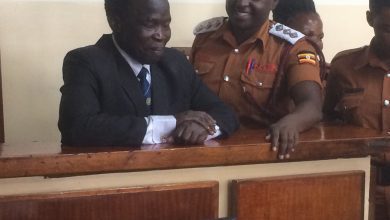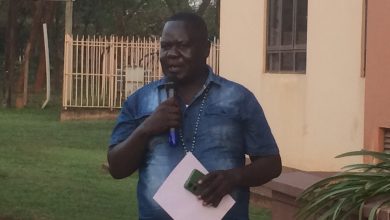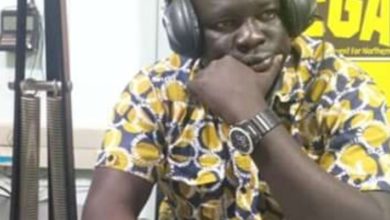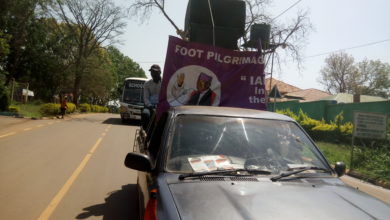Global Politics
UGANDA: INTERNATIONAL CRIMINAL COURT DISMISSES DOMINIC ONGWEN’S APPEAL Error! Filename not specified.
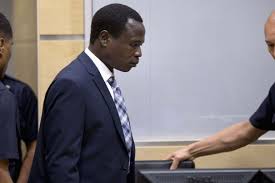
Dominic Ongwen (centre) attends one of the ICC court sessions (ICC File photo).
Maria Mabinty Kamara, the International Criminal Court Field office outreach for East Africa has revealed that the ICC has so far employed 30 clerks for registration of war victims across Northern Uganda. The victims are among others categorized as child recruits, victims of forced marriages, rape and defilement in the hands of both warring parties in Northern Uganda.
However, Dominic Ongwen’s appeal against his conviction for a 25-year jail term has been rejected and he remains incarcerated in a Norwegian prison.
Dominic Ongwen was a child abductee who transformed into a very notorious warlord, a thorn-in-flash to Uganda People Defense Forces (UPDF) during the Lord’s Resistance Army (LRA) rebellion against the Government of Uganda, a protracted rebellion that took close to two decades within Uganda and now with semblance still remaining and still active in the Central African Republic with occasional incursions into Darfur region in Sudan.
GULU CITY-TUESDAY APRIL, 8, 2025.
By Okumu Livingstone Langol
Maria Mabinty Kamara, addressed the press through teleconference Gulu, April 7, to brief Northern Uganda Media Club (NUMEC), including the Guardian News Correspondent, about the dismissal of Dominic Ongwen’s appeal against his conviction. The Guardian News News Correspondent pressed Maria Mabinty Kamara why the keen interest in rejecting Dominic’s Ongwen’s appeal conscripted into the rebel ranks as a minor when the likes of Benjamin Netanyahu and President Vladimir Putin have not been held accountable for alleged war crimes.
Maria Mabinty Kamara said the Netanyahu’s case notwithstanding, the ICC remains an impartial court and does not look for patronage from powerful politicians, although she recognizes the support forthcoming from some countries, but says that does not bias their resolves.
Maria Kamara verbatim
“International Criminal Court appeals judges, Thursday, rejected the appeal by a former commander in the brutal Ugandan rebel group Lord’s Resistance Army of his conviction on dozens of charges of war crimes and crimes against humanity and upheld his 25-year sentence.
“In a landmark judgment nearly two years ago, Dominic Ongwen was convicted of 61 offences that included murders, rapes, forced marriages and recruiting child soldiers in 2002-2005.
His lawyers unsuccessfully raised 90 grounds for the appeal, alleging legal, procedural and factual errors in the conviction and sentence.
“The appeals chamber rejects all the defense’s grounds of appeal and confirms unanimously the conviction decision,” Presiding Judge Luz del Carmen Ibanez Carranza said as Ongwen listened intently through a headset.
In a majority ruling, the five-judge appeals panel also upheld his sentence. Ibanez Carranza though issued a partially dissenting opinion, saying she would have asked trial judges to reconsider Ongwen’s sentence in part because she believed they wrongly calculated the number of his victims and partially to acknowledge his status as a victim.
Ongwen was himself abducted by the shadowy militia as a 9-year-old boy and transformed into a alleged ruthless child soldier. At trial, his Defence lawyers said his abduction and indoctrination in the LRA as western media and orchestrated UPDF, Uganda military has been dumbing support to white wash LRA and made Ongwen a “victim and not a victim and perpetrator at the same time.”
Ibanez Carranza said in her dissenting opinion that the issue could have been addressed with a new sentence for Ongwen that could “acknowledge his victim status and reinstate the dignity that was tacken away from him when he was only a defenseless child.” However, because she was in the minority, the sentence remained unchanged.
The appeals chamber rejected arguments that he was mentally unfit to be convicted and that he was under duress at the time of his offences.
The Lord’s Resistance Army was formed by its leader, Joseph Kony, as an anti-government rebel force in Uganda. It was accused of widespread atrocities, including mass killings, mutilations, recruiting and using child soldiers, and keeping girls as sex slaves. At one time during Northern Uganda military on slaughtered, in one time massacre took places in 10 location in Acholi Sub Region, and such Joseph Kony was being communicated by field officers. After learning all those killing, he resorted.
“Even if we deployed all our fighting forces, LRA we could not cover all the killing places we have been accused of killing.” Joseph Kony reportedly said
A military campaign forced the LRA out of Uganda in 2005, scattering its members across central Africa. Reports over the years have claimed that Kony was hiding in Sudan’s Darfur region or in a remote corner of the Central African Republic, where LRA fighters continued to kill and abduct people during occasional village raids, and where Ongwen was arrested in 2015.
Kony, who is a fugitive from the International Criminal Court, became internationally notorious in 2012 when the US-based advocacy group Invisible Children made a viral video highlighting the LRA’s crimes.
Many people in Acholi Sub Region believed that Joseph Kony, LRA warlord has defeated the Veto’s power, challenged both USA and Russia despite the fact that he does not own military manufacturing weapons neither he has industries to manifesting Aeroplane, but still posing threat, people say.
Below are excerpts of the summary Judgment of the Appeals Chamber in the Prosecutor v. Dominic Ongwen (Ongwen A3) 7 April 2025 Page 1 of 8 INTRODUCTION 1. 2. 3. Today, 7 April 2025, the Appeals Chamber of the International Criminal Court (“ICC” of “Court”) is delivering its judgment on the appeal of the Defence of Mr. Dominic Ongwen (the “Defence”) against the decision of Trial Chamber IX of 28 February 2024 entitled “Reparations Order” (the “Impugned Decision”).
The Appeals Chamber in this appeal is composed of Judge Solomy Balungi Bossa, Presiding, Judge Tomoko Akane, Judge Luz del Carmen Ibáñez Carranza, Judge Gocha Lordkipanidze and Judge Erdenebalsuren Damdin. This is a non-authoritative summary of the Appeals Chamber’s written judgment in the appeal. The detailed written judgment is the authoritative text.
Background of the appeals 4. Mr. Ongwen was convicted, on 4 February 2021, of crimes against humanity and war crimes and sentenced to 25 years of imprisonment. On 28 February 2024, the Trial Chamber issued the Impugned Decision, which the Defence subsequently appealed.
The Defence raises eleven grounds of appeal. MERITS Ground of appeal 1: Alleged erroneous refusal to disclose the names of victims 5. 6. 7. Under the first ground of appeal, the Defence submits that the Trial Chamber erred by refusing to order the disclosure of the names of the potential beneficiaries of reparations. The Appeals Chamber notes that, when deciding to maintain the redactions applied to the potential beneficiaries’ dossiers, the Trial Chamber referred to the victims’ concerns for their safety upon Mr. Ongwen’s return after serving the sentence.
In their submissions to the Trial Chamber, the victims also referred to the threat which, in their view, the Lord’s Resistance Army still poses. The Trial Chamber thus identified the danger that the disclosure of the identity of potential beneficiaries might cause.
Furthermore, the Appeals Chamber notes that, despite this non-disclosure, the Defence was able to make its observations on the Victims’ dossiers. The Defence has therefore Page 2 of 8 failed to demonstrate that it was “unable to make a fair assessment” and that its right to conduct a meaningful review of the victims’ dossiers was unduly affected. The Appeals Chamber rejects the first ground of appeal.
Ground of appeal 2: Alleged errors in the Trial Chamber’s findings relating to domestic proceedings 8. 9. Under the second ground of appeal, the Defence submits that the Trial Chamber erred in rejecting the Defence’s request concerning “dual claimants”, who, in the view of the Defence, will benefit both from an award made by the High Court of Uganda and from the award made in the Impugned Decision. The Appeals Chamber observes that the decision of the High Court of Uganda addresses harms arising out of an alleged violation, by the government of Uganda, of the land owners’ “right to property and to a clean environment”, and not from any crimes under the Statute.
It therefore rejects the Defence’s contentions regarding the alleged overlap between the plaintiffs in the case before the High Court of Uganda and the victims in the present case. 10. The Appeals Chamber rejects the second ground of appeal.
Ground of appeal 3: Alleged erroneous presumption regarding residents of IDP camps and non-residents present at the time of the attacks 11. Under the third ground of appeal, the Defence submits that the Trial Chamber erred by presuming that civilian residents of camps for internally displaced persons, as well as non-residents who were present in these camps at the time of the attacks were victims of the war crime of attack against the civilian population and persecution. 12. The Appeals Chamber observes that the Defence appears to confuse the aforementioned presumption of victimhood with a presumption of harm adopted by the Trial Chamber with respect to the victims of the same crimes.
The Trial Chamber, however, clearly considered victimhood and harm as two distinct elements, both of which must be cumulatively met in order for a person to be eligible to benefit from reparations. Furthermore, the Defence has not identified any error in the Trial Chamber’s adoption of the aforementioned presumptions of victimhood and harm.
Page 3 of 8 13. The Appeals Chamber rejects the third ground of appeal. Fourth, eleventh and twelfth grounds of appeal: Alleged errors concerning the Trial Chamber’s consideration of the Acholi traditional and cultural factors and mechanisms 14. Under the fourth, eleventh and twelfth grounds of appeal, the Defence alleges errors in relation to the Trial Chamber’s consideration of the concept of extended family. It also raises issues concerning the complementarity role of the Acholi traditional and cultural mechanisms and factors such as mato oput and cen. 15. The Appeals Chamber considers that the Defense has failed to show any errors in relation to the Trial Chamber’s understanding of the concept of extended family in its determination and projections on indirect victims of the attacks. 16.
Regarding the principle of complementarity, to the extent that the Defence argues that the traditional and cultural mechanisms should be incorporated into the Court’s statutory framework, its argument has already been rejected on appeal.
Furthermore, the Defence has failed to explain how these mechanisms should be incorporated into the reparation system under the Court’s legal texts and how such incorporation would affect the scope of Mr. Ongwen’s liability for reparations. 17. Contrary to the Defence’s claim, the Trial Chamber did not “equate” sent to “mental illness in Western medicine”. Rather, the Trial Chamber found that victims of the attacks and direct victims of the crimes against child soldiers suffered “moral harm” which includes “spiritual disturbances (cen)” that had long-lasting consequences. 18. The Appeals Chamber, therefore, rejects the fourth, eleventh and twelfth grounds of appeal. Fifth ground of appeal: Alleged error in the Trial Chamber’s decision to award a symbolic cash payment of EUR 750 to each victim 19. Under the fifth ground of appeal, the Defence submits that the Trial Chamber erred by awarding a symbolic cash payment of EUR 750 to each victim, as such an award is not provided in the Statute or the Rules. Page 4 of 8 20. The Appeals Chamber finds that a trial chamber may order modalities of reparations beyond restitution, compensation and rehabilitation, including those with a symbolic value. 21.
The Appeals Chamber previously determined that “collective reparations can include the payment of sums of money to individuals to repair harm suffered”. This does not mean that any such payment must be considered as a compensation. The determination of whether a given modality of reparations is appropriate must be decided on a case-by-case basis. It must be grounded in the determination of the harms caused. 22. The Defence has failed to demonstrate that the Trial Chamber erred when it made a symbolic monetary award. The Appeals Chamber rejects the fifth ground of appeal.
Sixth ground of appeal: Alleged error in prioritizing participating direct victims over non-participating direct victims 23. Under the sixth ground of appeal, the Defence submits that the Trial Chamber erred by prioritizing participating direct victims over non-participating direct victims. 24. The Appeals Chamber notes that the Defence misrepresents the Impugned Decision by focusing its arguments on the victims’ participation status alone. However, this is merely a part of the prioritization scheme, which in fact sets out the priority primarily according to the victims’ vulnerability and needs. The Appeals Chamber rejects the sixth ground of appeal.
Seventh ground of appeal: Alleged error in failing to require medical documentation 25. Under the seventh ground of appeal, the Defence submits that the Trial Chamber erred by failing to require two persons in the Sample to provide medical documentation to prove their disabilities. 26. The Appeals Chamber notes that these two victims, in their applications, make no mention of either of them having received assistance from a medical professional. The Defence does not explain why it believes that they received such assistance. Nor does the Defence substantiate its assertion that these two victims have medical documentation concerning their injuries. Page 5 of 8 27. The Appeals Chamber rejects the seventh ground of appeal.
Eighth ground of appeal: Alleged errors concerning the scope of Mr. Ongwen’s liability in relation to his time as the commander of the Sinia brigade 28. Under the eighth ground of appeal, the Defence submits that the Trial Chamber erred in its estimation of the number of victims of the thematic crimes, by failing to take into account that Mr. Ongwen was appointed as the commander of the Sinia brigade on 4 March 2004. 29. The Appeals Chamber finds it inappropriate that the Defence attempts to re-litigate the same issue that has already been settled in the previous appellate proceedings with respect to the Conviction Decision. The Appeals Chamber finds that the Defence has failed to demonstrate any error in the Trial Chamber’s dismissal of the Defence’s submission in this regard. 30. The Appeals Chamber rejects the eighth ground of appeal.
Ninth ground of appeal: Alleged errors concerning the Trial Chamber’s use of the divisor of four, instead of five, in relation to the number of LRA brigades 31. Under the ninth ground of appeal, the Defence submits that the Trial Chamber erred by dividing the estimated number of former child soldiers and victims of sexual and gender based crimes in the Lord’s Resistance Army by four, instead of five. 32. The Appeals Chamber notes that the Defence contends again that there were four LRA brigades and Control Altar, which also “acted as a brigade”, without demonstrating any error by the Trial Chamber. The Appeals Chamber finds that the Defence has not shown that the Trial Chamber’s use of the divisor of four was unreasonable. 33. The Appeals Chamber rejects the ninth ground of appeal.
Thirteenth ground of appeal: Alleged erroneous assessment of moral harm 34. Under the thirteenth ground of appeal, the Defence submits that the Trial Chamber erred in determining that victims suffered moral harm, without requiring psychological evidence or the examination of the victims by a psychologist. Page 6 of 8 35. However, the Defence raises this issue for the first time on appeal. It did not raise its concerns in the proceedings before the Trial Chamber. As a result, the Trial Chamber did not have an opportunity to consider the Defence’s arguments in this respect and make a finding thereupon. If the Appeals Chamber were to examine them, this would exceed the scope of its appellate review. Therefore, the Appeals Chamber therefore dismisses these arguments of the Defence. 36. The Defence also avers that it was a “double standard” for the Trial Chamber to refuse to recognize Mr. Ongwen’s victimhood, while addressing similar victimhood with respect to victims of the LRA.
However, the Trial Chamber made findings on Mr. Ongwen’s victimhood in order to determine whether he was criminally responsible. This is materially different from the present reparation proceedings, where the Trial Chamber’s enquiry was whether victims are eligible to benefit from the awards for reparations. 37. The Appeals Chamber rejects the thirteenth ground of appeal.
Fourteenth ground of appeal: Alleged errors concerning the Trial Chamber’s eligibility assessment of four victims in the Sample 38. Under the fourteenth ground of appeal, the Defence submits that the Trial Chamber erred in its assessment of the dossiers of four victims, because it did not meet the standard of balance of probabilities. 39. In respect of the first and second victims, the Appeals Chamber notes that the Defence misrepresents the Trial Chamber’s relevant findings and fails to identify any error of the Trial Chamber therein. 40. Regarding the third and fourth victims, the Appeals Chamber notes that the Defence was able to make its observations on their dossiers, despite the redactions applied to some of the information.
Furthermore, the Trial Chamber had before it the unredacted accounts of all victims in the Sample and, on this basis, it was able to determine coherency and credibility of their accounts. 41. The Appeals Chamber rejects the fourteenth ground of appeal. Page 7 of 8 APPROPRIATE RELIEF 42. For these reasons, and for the reasons stated more fully in the written judgment, the Appeals Chamber rejects the Defence’s appeal and confirms the Impugned Decision. Page 8 of 8

